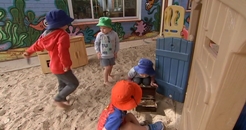 8 things to remember about child development
8 things to remember about child development
From an article by Harvard University's Centre for the Developing Child
The Centre for the Developing Child has published a list of key findings from evidence gathered over decades and more recently about aspects of early child development.
Here is a summary:
1) Even infants and young children are affected adversely when significant stresses threaten their family and caregiving environments.
Adverse fetal and early childhood experiences can lead to physical and chemical disruptions in the brain that can last a lifetime. The biological changes increase the risk not only for impairments in future learning capacity and behavior, but also for poor physical and mental health outcomes.
2) Development is a highly interactive process, and life outcomes are not determined solely by genes.
Children are born with the capacity to learn to control impulses, focus attention, and retain information in memory, but their experiences as early as the first year of life lay a foundation for how well these and other executive function skills develop.
3) While attachments to their parents are primary, young children can also benefit significantly from relationships with other responsive caregivers both within and outside the family.
Close relationships with other nurturing and reliably available adults do not interfere with the strength of a young child’s primary relationship with his or her parents.
4) A great deal of brain architecture is shaped during the first three years after birth, but the window of opportunity for its development does not close on a child’s third birthday.
The basic principle that “earlier is better than later” generally applies, however, the window of opportunity for most domains of development remains open far beyond age 3, and we remain capable of learning ways to “work around” earlier impacts well into the adult years.
5) Severe neglect appears to be at least as great a threat to health and development as physical abuse—possibly even greater.
When compared with children who have been victimized by overt physical maltreatment, young children who experienced prolonged periods of neglect exhibit more serious cognitive impairments, attention problems, language deficits, academic difficulties, withdrawn behavior, and problems with peer interaction as they get older.
6) Young children who have been exposed to adversity or violence do not invariably develop stress-related disorders or grow up to be violent adults.
Although children who have these experiences clearly are at greater risk for adverse impacts on brain development and later problems with aggression, they are not doomed to poor outcomes. Indeed, they can be helped substantially if reliable and nurturing relationships with supportive caregivers are established as soon as possible and appropriate treatments are provided as needed.
7) Simply removing a child from a dangerous environment will not automatically reverse the negative impacts of that experience.
There is no doubt that children in harm’s way should be removed from dangerous situations immediately. Similarly, children experiencing severe neglect should be provided with responsive caregiving as soon as possible. That said, children who have been traumatized need to be in environments that restore their sense of safety, control, and predictability, and they typically require therapeutic, supportive care to facilitate their recovery.
8) Resilience requires relationships, not rugged individualism.
The capacity to adapt and thrive despite adversity develops through the interaction of supportive relationships, biological systems, and gene expression. Despite the widespread yet erroneous belief that people need only draw upon some heroic strength of character, science now tells us that it is the reliable presence of at least one supportive relationship and multiple opportunities for developing effective coping skills that are the essential building blocks for strengthening the capacity to do well in the face of significant adversity.
Dr Jack Shonkoff from the Centre said in a recent interview, "I think the biggest challenge is to not think of this as just an education issue. This is as much about building a foundation for lifelong physical and mental health. This is as much an issue for economic productivity and for kind, responsible citizenship, so I think we will all benefit if we stop thinking of this as just an early education issue, and think of this as investing in the future health, well-being, and productivity of succeeding generations. That's the challenge. It's not in one budget. It's not in one sector. There's an early childhood dimension to all of the issues that we care about in society, and we will get best results if we think of that in a holistic way."
Read more and download the report from here.
Retweet about this article:
From an article by Harvard University's Centre for, 25/04/2017